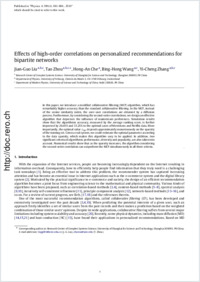Effects of high-order correlations on personalized recommendations for bipartite networks
- Liu, Jian-Guo Research Center of Complex Systems Science, University of Shanghai for Science and Technology, China - Department of Physics, University of Fribourg, Switzerland - Department of Modern Physics, University of Science and Technology of China, Hefei, China
- Zhou, Tao Research Center of Complex Systems Science, University of Shanghai for Science and Technology, China - Department of Physics, University of Fribourg, Switzerland - Department of Modern Physics, University of Science and Technology of China, Hefei, China
- Che, Hong-An Research Center of Complex Systems Science, University of Shanghai for Science and Technology, China
- Wang, Bing-Hong Research Center of Complex Systems Science, University of Shanghai for Science and Technology, China - Department of Modern Physics, University of Science and Technology of China, Hefei, China
- Zhang, Yi-Cheng Research Center of Complex Systems Science, University of Shanghai for Science and Technology, China - Department of Physics, University of Fribourg, Switzerland - Department of Modern Physics, University of Science and Technology of China, Hefei, China
-
31.10.2009
Published in:
- Physica A. - 2010, vol. 389, no. 4, p. 881-886
English
In this paper, we introduce a modified collaborative filtering (MCF) algorithm, which has remarkably higher accuracy than the standard collaborative filtering. In the MCF, instead of the cosine similarity index, the user–user correlations are obtained by a diffusion process. Furthermore, by considering the second-order correlations, we design an effective algorithm that depresses the influence of mainstream preferences. Simulation results show that the algorithmic accuracy, measured by the average ranking score, is further improved by 20.45% and 33.25% in the optimal cases of MovieLens and Netflix data. More importantly, the optimal value $\lambda\textsubscript{opt}$ depends approximately monotonously on the sparsity of the training set. Given a real system, we could estimate the optimal parameter according to the data sparsity, which makes this algorithm easy to be applied. In addition, two significant criteria of algorithmic performance, diversity and popularity, are also taken into account. Numerical results show that as the sparsity increases, the algorithm considering the second-order correlation can outperform the MCF simultaneously in all three criteria.
- Faculty
- Faculté des sciences et de médecine
- Department
- Département de Physique
- Language
-
- English
- Classification
- Physics
- License
- License undefined
- Identifiers
-
- RERO DOC 17083
- DOI 10.1016/j.physa.2009.10.027
- Persistent URL
- https://folia.unifr.ch/unifr/documents/301481
Statistics
Document views: 79
File downloads:
- liu_ehc.pdf: 143
